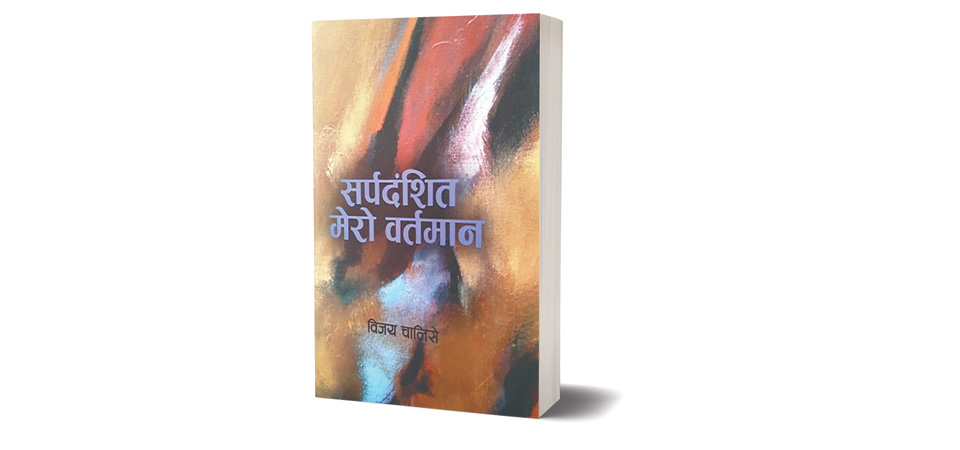Short And Sharp Explanations

Gandhi Raj Kafle
There is a diversity of introduction about Vijaya Chalise, the author of under review book "Sarpadanshit Mero Bartaman." He is a senior journalist who spent more than three decades for publications of the Gorkhapatra, the government-owned historic publishing house in Nepal. But he has some other equally acknowledged contributions, too. He is a litterateur with a distinct interest in literary genres like child literature, travelogue and story writing.
His profile extends to managerial jobs, in which he performed in the capacity of executive chairman at the Gorkhapatra Corporation. However, amidst these interests and responsibilities, Nepali literature is a much-loved and enjoyable area for him.
After having a cursory glance over Chalise's, we should now turn our attention to a new book penned by him, which thematically explains his literary observations and writings out of his own diverse experiences.
Chalise has taken time as a superior thing and it is that vision with which he has artistically interpreted subjects of literature in this book. The title words of this book "Sarpadanshit Mero Bartaman" also signal that the author is cautioning against what we must leave and what we must welcome to become truly reform-loving individuals and society. In this context, Chalise has often become harsh about blind imitations of Western traditions and cultures and is categorically critical about our indifference towards our values, cultures and norms.
There are twenty-seven essays in this anthology. All of these have been already published – many in the Gorkhapatra publications themselves and remaining others in other leading literary magazines of the country.
But, now with skilful compilation and editing, they have come into book form and it will enable readers of the Nepali literature to have read about how the author has interpreted different periods with various themes related to our habitual setback, which is one of the main causes of slow progress.
Outwardly, "Sarpadanshi Bartaman" is only a piece of essay in this anthology, but in its deep meaning, it is symbolic to all of his essays. It is a thread-point, which in a way has become a common theme to weave a garland of thoughts in this book. The pieces are small in size and are also filled with journalistic flavours and here we can remember the oft-quoted remark 'journalism is a literature in hurry'.
Chalise in this book reminds and re-reminds of the fact in his literary art that in every big change there are regressive elements, which keep intruding and make big changes ineffective. Also, the process is still valid even today.
But, the solution to the problem is not as easy as we perceive. We often point out our figure in the names of responsible people only. But, in fact, we as a society, too, have a role and it is a soul-searching thing.
This is his point of literary interpretations in this book and he keeps arguing artistically in his essays like "Lahure Banaundai Chha Malai Mero Desh" (My Country is Making Me a Lahure), "Bideshko Mohale" (In Love of Going Abroad), "Bhanu, Harry Potter Ra Sanchar Madhyam" (Bhanu, Harry Potter and Means of Communications), "Valentine's Day, Glamarko Khoji Ra Nepali Samaj" (Valentine's Day, Search of Glamour and Nepali Society), "Mulyabighatanko Sarpadansha Ra Rachanadharmita" (Deconstruction of Values and Literary Creativity), "Aaunuhos, Samuhik Aatmahatya Garaun" (Come, Let's Commit Suicide Jointly) and "Nakabandima Phaseko Mero Desh" (My Country Is Trapped In The Economic Blockade). The word 'Sarpadansha' and our careless attitude not to abandon the impact of ill-attitude analysed by Chalise are relevant even today.
We can see and observe our present: What we are supposed to get from change is either extremely slow or very chaotic. To alter this reality, we must abandon the illogical and unproductive old habits that have come down from history with us. Chalise loves to call this legacy as 'sting of a snake' or the vernacular Nepali 'Sarpadansha'.
There are both similarities and dissimilarities between literature and journalism. Journalism delivers facts and information, but literature believes in decorating and enriching human sentiments. Certainly, Author Chalise's collected essays have plenty of information to know about, but they have followed norms of literature.
To sum up, these essays alert us not to forget our language, culture, tradition and social identity. The aim of literature everywhere is to explore values to glorify life and it can't be achieved only from the fulfilment of materialistic gains. In this context, this anthology of essays is a welcome piece because it argues in favour of our national values, which are at risk day by day in the name of an open society.
Recent News

Do not make expressions casting dout on election: EC
14 Apr, 2022
CM Bhatta says may New Year 2079 BS inspire positive thinking
14 Apr, 2022
Three new cases, 44 recoveries in 24 hours
14 Apr, 2022
689 climbers of 84 teams so far acquire permits for climbing various peaks this spring season
14 Apr, 2022
How the rising cost of living crisis is impacting Nepal
14 Apr, 2022
US military confirms an interstellar meteor collided with Earth
14 Apr, 2022
Valneva Covid vaccine approved for use in UK
14 Apr, 2022
Chair Prachanda highlights need of unity among Maoist, Communist forces
14 Apr, 2022
Ranbir Kapoor and Alia Bhatt: Bollywood toasts star couple on wedding
14 Apr, 2022
President Bhandari confers decorations (Photo Feature)
14 Apr, 2022











